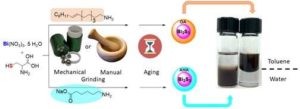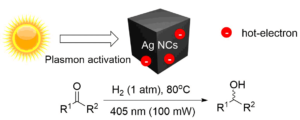School seminar: Solvent-free approaches to nanoparticles synthesis and polymer functionalization and plasmonic catalytic hydrogenation reactions
Speaker: Professor Audrey Moores, Centre for Green Chemistry, McGill University, Canada
Host: Associate Professor Liz New [Map]
Nanomaterials are intensely researched for their powerful properties applicable in the broad fields of medicine, electronics, optics and catalysis. We developed a novel synthetic method for the scalable production of metal and metal sulfide NPs under solvent-free, mechanochemical conditions. The synthesis of Au NPs provided access to monodisperse and ultra-small NPs in the size range of 1–4 nm, without external reducing agents or bulk solvents.1 Using lignin as a biomass-based reducer, we could access embedded NPs of Au, Ru, Pd and Re.2 With Ag, this method gave access to antibacterial filters in a simplified fashion.3 We also explored the synthesis of metal sulfide with similar Bi2S3 nanoparticles were easily synthesized by mechanochemical activation from molecular precursors and cysteine as a sulfur source, followed by aging to afford X-ray active materials. These materials are exciting candidates for cancer detection.4 In last examples, I’ll illustrate how mechanochemistry and aging techniques may be used towards the efficient functional of man-made and biomass based polymers, such as cellulose nanocrystals5 and chitin.6

Besides, we have employed silver nanocubes for hydrogen activation and hydrogenation of ketones and aldehydes via irradiation at 405 nm, corresponding to the position of the plasmon band of the nanocubes.7 Exposure to other wavelengths, or absence of light failed to provide activity thus proving the plasmonic effect. Compared to other catalytic systems, the plasmonically activated catalyst provides access to primary and secondary alcohols using milder conditions, in a highly atom economical fashion.

Selected publications:
- M. J. Rak, N. K. Saadé, T. Friščić and A. Moores, Green Chem., 2014, 16, 86-89.
- M. J. Rak, T. Friščić and A. H. Moores, Faraday Discuss., 2014, 170, 155-167.
- M. J. Rak, T. Friščić and A. Moores, RSC Adv., 2016, 6, 58365-58370.
- M. Y. Malca, H. Bao, T. Bastaille, N. K. Saadé, J. M. Kinsella, T. Friščić and A. Moores, Chem. Mater., 2017, 29, 7766–7773.
- B.G. Fiss, L. Hatherly, R.S. Stein, T. Friščić, A. Moores, ACS Sustainable Chem. Eng. 2019, 7 (8), 7951-7959.
- T. Di Nardo, C. Hadad, A. Nguyen Van Nhien, A. Moores, Green Chem. 2019, 21, 3276-3285
- M. Landry, A. Gellé, B. Y. Meng, C. J. Barrett and A. Moores, ACS Catal., 2017, 7, 6128–6133.
About the speaker:
Audrey Moores is an Associate Professor of Chemistry and Tier II Canada Research Chair in Green Chemistry (2007-17) at McGill University, where she started her independent career in 2007. She completed her PhD from the Ecole Polytechnique, France in 2005, under the supervision of Prof. Pascal Le Floch and received the Best Thesis award of the Ecole Polytechnique that year. She was a post-doctoral fellow at Yale University in 2006 under the guidance of Prof. Robert H. Crabtree, funded by a Lavoisier fellowship from the European Union.
She is a leading expert in the field of catalysis using metal, metal oxide and biomass-based nanomaterials, with a special emphasis on sustainable processes and use of earth abundant starting materials. Her research was recently highlighted in Nature in 2016, and she was selected as an emerging leader in 2017 by the RSC journal Green Chemistry. Her scientific contributions are well cited (>3680 citations; h-index=30).
She is the associate director of the Facility for Electron Microscopy Research (FEMR) at McGill since 2017 and the co-lead of the McGill Sustainability Systems Initiative- Material theme, since 2017. She was the co-associate director of the CCVC for 4 years (2012-2016) and the scientific director in the board of GreenCenter Canada, an Ontario-based tech transfer company (2016-2019). She is a member of the advisory board of the Green Chemistry Institute (America Chemical Society) since 2018. Since 2016, she is an associate editorship for ACS Sustainable Chemistry & Engineering.
She received a Discovery Accelerator Supplement Award in 2018 from the Natural Sciences and Engineering Research Council of Canada, was invited by the United Nations Industrial Development Organization for to teach a 5-day workshop in South Africa in the fall 2018 and was recognized as one of the three finalists for the McGill Principal’s prize for public engagement through media in 2019. In 2022, she will co chair the Gordon Research Conference in Green Chemistry.

